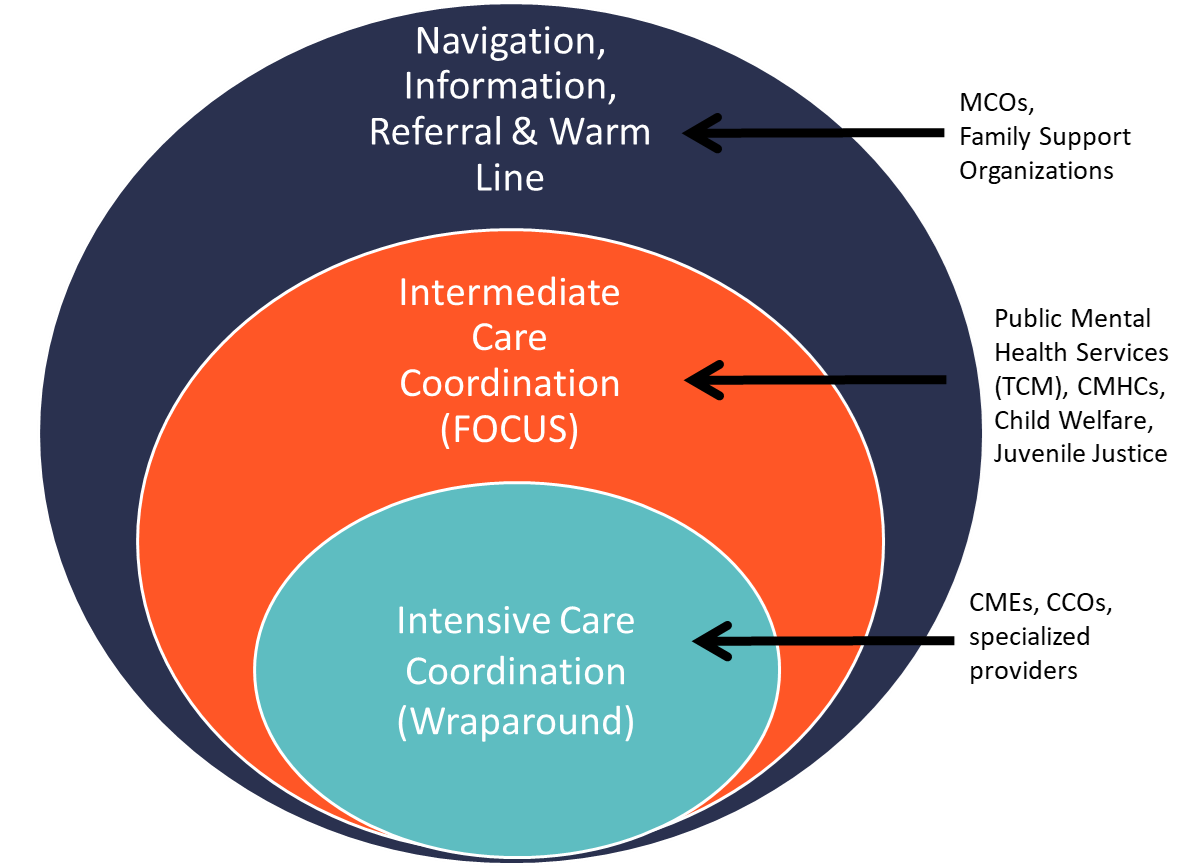Wraparound Blog
Bridging the Wraparound Gap: How FOCUS Works for Families with Less Intensive Needs
June 14, 2024 | NWI
Research has consistently shown that Wraparound care coordination can help keep youth with the most complex needs “at home, in school, and out of trouble,” while also reducing strain on caregivers, and reducing costs from out of home placements. As a result, families and state and local systems of care leaders alike often advocate for intensive care coordination programs that adhere closely to Wraparound principles. But what does care coordination look like for families of children and youth with less intensive needs?
To build “tiered” systems of care coordination that can be right-sized to the diverse needs of families, an increasing number of states and localities have sought support from the National Wraparound Implementation Center (NWIC) to implement care coordination at intermediate levels of intensity. Meanwhile, leaders in other settings, such as schools, have found that intermediate care coordination is more feasible to implement with available staff (such as school social workers) compared to intensive, full-fidelity Wraparound.
For such goals and service settings, NWIC, and the Innovations Institute at the University of Connecticut, have developed FOCUS, a model designed to bring the benefits of care coordination to families with complex – but less intensive – needs.
FOCUS modernizes traditional case management models by integrating a person- and family-centered care value base with empirically supported practice elements shown to improve engagement and outcomes for youth and families. The model supports decreased system involvement while working to build connections and supports for families through community-based resources. As an intermediate care coordination model applicable across behavioral health, child welfare or juvenile justice systems, FOCUS is a key component of a three-tiered care coordination approach:
- Wraparound for youth with the most intense needs,
- FOCUS at the intermediate (or tier 2) intensity, and
- Family navigation (i.e., information, warm referrals and handoffs) for children and youth with lower intensity needs.
Figure 1. Levels of Need Served by Systems
Click image to open larger version
Systems implementing FOCUS provide right-sized community-based and family-centered care coordination that is a better fit for a youth and family’s unique constellation of strengths and needs. The FOCUS care planning process prioritizes an authentic partnership with the family and results in the development and continual refinement of a plan of care, based on active tracking of targets such as progress toward outcomes, achievement of the family’s vision, and satisfaction.
For FOCUS, fidelity is grounded in four key elements that is demonstrated by the care coordinator across each of the phases of the FOCUS planning process:
- family-anchored
- individualized
- accountable
- comprehensive
Examples of family-anchored practices include the cultivation of an authentic partnership with the family starting with information-gathering (e.g., learning from the family what has worked in the past and what might be helpful), capturing ratings from the family around their satisfaction and progress, and modifying the plan accordingly.
Individualized practices build from the uniqueness, skills, interests, hopes, and desires of each person in the family.
Accountable speaks to the care coordinator’s role in monitoring services and supports for completion, impact and satisfaction. The care coordinator might demonstrate accountability by openly discussing progress with the family, as the plan is reviewed and adjusted often to ensure the plan serves the family’s needs.
Comprehensive means that the care coordinator accesses community options and evidenced based practices, planning around all areas of need including medical needs. The FOCUS care coordinator includes multiple perspectives in the planning process and attends to outcomes across systems and environments.
Where does FOCUS come in? In addition to focusing on the family and its needs, the FOCUS care coordinator’s activities ensure…
Families are experiencing meaningful connections. Research tells us that positive relationships are necessary for healing, so positive interactions between family members are prioritized and elevated.
Outcomes are being tracked to ensure the things that cause the family the most pain are indeed getting better.
Coordination of the planning process means that everyone connected to the family works toward a common goal.
Unconditional positive regard is demonstrated – children, youth and their families are genuinely accepted no matter what.
The process is Short-term, with the goal of quickly building sustainable connections between families and their community’s resources, and minimizing system reliance.
The goal of FOCUS is to ensure that the care coordination workforce across child welfare, behavioral health, juvenile justice and/or education are well-trained and consistently demonstrating best practices as they achieve sustainability of FOCUS across their states, agencies, and/or organizations.
In Washington State, the Wraparound Evaluation and Research Team (WERT) evaluated FOCUS as an option for use in schools, in a project funded by a federal research grant from the U.S. Department of Education. Preliminary evidence has shown FOCUS to be feasible and well-received by parents of elementary students who were served.
We look forward to reporting back to the NWI community on the progress of FOCUS (especially as it sits alongside Wraparound), including results of evaluation aimed to continually improve the model.
For more information about FOCUS or the Innovations Institute’s comprehensive support for state-wide dissemination and installation of FOCUS, visit the Innovations Institute online or by email at FOCUSinfo@uconn.edu.
Coming in 2025
The University of Connecticut School of Social Work and Innovations Institute will unveil the FOCUS Certificate Program, an opportunity for agency teams to receive training and individualized coaching towards fidelity model practice at the frontline, supported by quality supervision and oversight.

